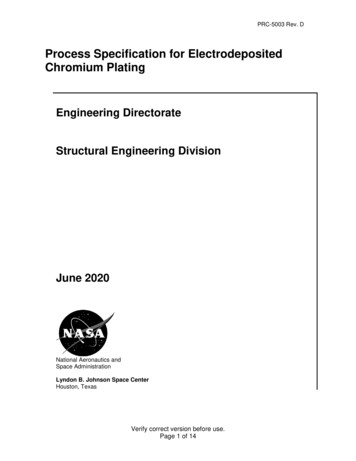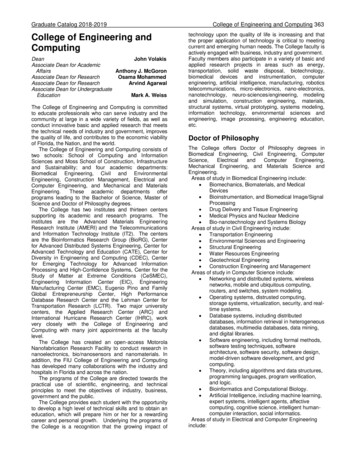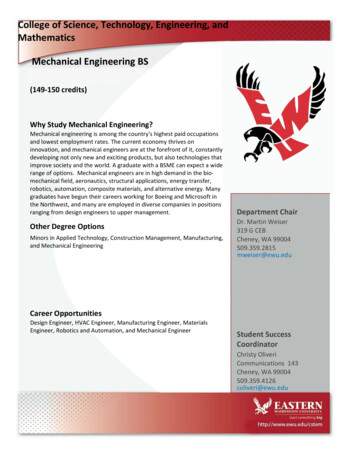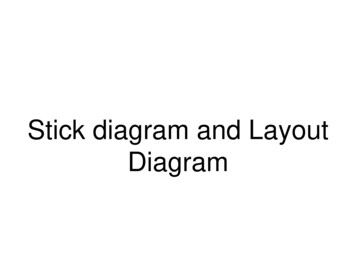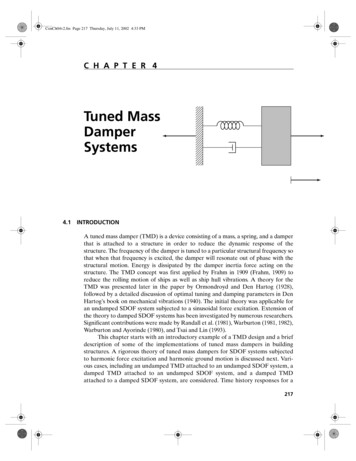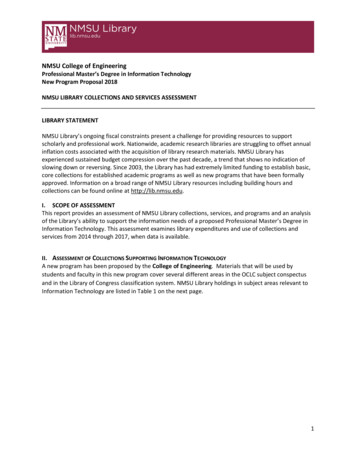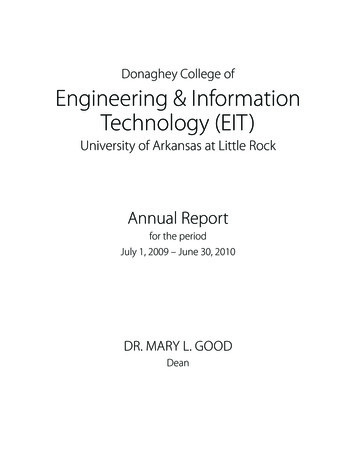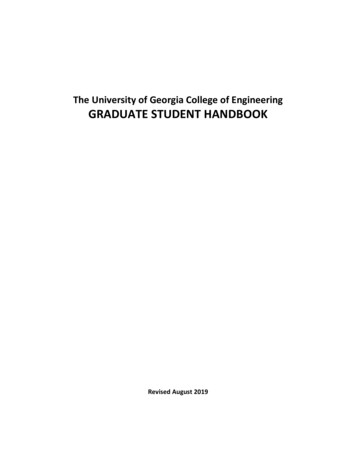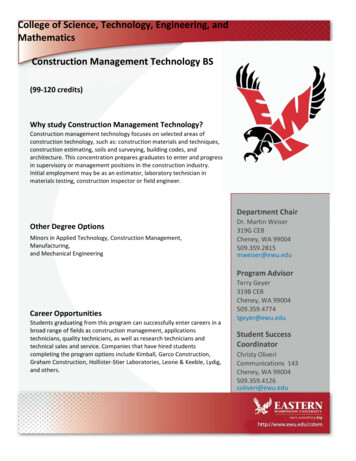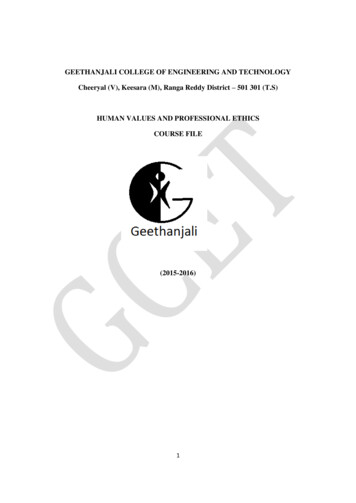
Transcription
GEETHANJALI COLLEGE OF ENGINEERING AND TECHNOLOGYCheeryal (V), Keesara (M), Ranga Reddy District – 501 301 (T.S)HUMAN VALUES AND PROFESSIONAL ETHICSCOURSE FILE(2015-2016)1
ContentsS.NO TOPICPAGE. NO.1Cover Page42Syllabus copy53Brief notes on the importance of the course and how it fits into the curriculum74Prerequisites if any75PEOs and POs76Course objectives and outcomes87Course mapping with Programme Outcomes98Instructional Learning Outcomes99Class Time Table1110Individual Time Table1111Lecture schedule with methodology being used/adopted1212Detailed notes1613Additional topics9814Tutorial class sheets9815University Question papers of previous years9816Question Bank10017Assignment Questions10218Discussion topics , if any10419Unit wise Quiz Questions10520References, Journals, websites and E-links if any11321Known gaps ,if any and inclusion of the same in lecture schedule1152
22Quality Measurement Sheets11523Course End Survey11524Teaching Evaluation11625Student List11626Group-Wise students list for discussion topic1163
Geethanjali College of Engineering and TechnologyDEPARTMENT OF ECE(Name of the Subject Course): Human Values and Professional Ethics.Subject Code: A50018(JNTU COLLEGE CODE: R1)Branch:ECEYear:3Semester:2Programme: UGVersion No: 1No. of Pages:Prepared by :Ms. P. Mercy Kavitha (Assoc Prof), Ms B. Vanaja Rani (Asst Prof) and Ms Latha Suhasini(Asst Prof)Date : 19-11-2015Verified & Updated by :Name : Ms. K. MadhumathiDesign :Date :Associate Professor23-11-2015Approved by (HOD) :Name : Dr. G. Neeraja RaniDate : 30-011-20154
SYLLABUSJAWAHARLAL NEHRU TECHNOLOGICAL UNIVERSITY HYDERABADIII Year B.Tech. CSE - I Sem L T/P/D C4 - / - /- 4(A50018) HUMAN VALUES AND PROFESSIONAL ETHICS(Open Elective)Objectives: This introductory course input is intended.a. To help the students appreciate the essential complementarity between 'VALUES' and 'SKILLS' toensure sustained happiness and prosperity which are the core aspirations of all human beings.b. To facilitate the development of a Holistic perspective among students towards life, profession andhappiness, based on a correct understanding of the Human reality and the rest of existence. Such aholistic perspective forms the basis of Value based living in a natural way.c. To highlight plausible implications of such a Holistic understanding in terms of ethical humanconduct, trustful and mutually satisfying human behaviour and mutually enriching interaction withNature.UNIT - I:Course Introduction - Need, basic Guidelines, Content and Process for Value Education: Understanding theneed, basic guidelines, content and process for Value Education. Self Exploration - what is it? - its contentand process; 'Natural Acceptance' and Experiential Validation - as the mechanism for self exploration.Continuous Happiness and Prosperity - A look at basic Human Aspirations. Right understanding,Relationship and Physical Facilities - the basic requirements for fulfillment of aspirations of every humanbeing with their correct priority. Understanding Happiness and Prosperity correctly - A critical appraisal ofthe current scenario. Method to fulfill the above human aspirations: understanding and living in harmony atvarious levels.UNIT - II:Understanding Harmony in the Human Being - Harmony in Myself! : Understanding human being as a coexistence of the sentient 'I' and the material 'Body'. Understanding the needs of Self ('I') and 'Body' - Sukhand Suvidha. Understanding the Body as an instrument of 'I' ( I being the doer, seer and enjoyer).Understanding the harmony of I with the Body: Sanyam and Swasthya; correct appraisal of Physical needs,meaning of Prosperity in detail. Programs to ensure Sanyam and Swasthya.5
UNIT - III:Understanding Harmony in the Family and Society - Harmony in Human - HumanRelationship: Understanding harmony in the Family the basic unit of human interaction. Understandingvalues in human - human relationship; meaning of Nyaya and program for its fulfillment to ensure Ubhaytripti; Trust (Vishwas) and Respect ( Samman) as the foundational values ofrelationship. Understanding the meaning of Vishwas; Difference between intention and competence.Understanding the meaning of Samman, Difference between respect and differentiation; the other salientvalues in relationship. Understanding the harmony in the society ( society being an extension of family):Samadhan, Samridhi, Abhay, Sah-astiva as comprehensive Human Goals. Visualizing a universalharmonious order in society - Undivided Society ( Akhand Samaj), Universal Order ( SarvabhaumVyawastha) - from family to world family!UNIT - IV:Understanding Harmony in the nature and Existence - Whole existence as Co-existence: Understandingthe harmony in the Nature. Interconnectedness and mutual fulfillment among the four orders of nature recyclability and self-regulation in nature. Understanding Existence as Co-existence (Sah-astiva) of mutuallyinteracting units in all-pervasive space. Holistic perception of harmony at all levels of existence.UNIT - V:Implications of the above Holistic Understanding of Harmony on Professional Ethics: Naturalacceptance of human values, Definitiveness of Ethical Human Conduct, Basic for Humanistic Education,Humanistic Constitution and Humanistic Universal Order. Competence in professional ethics:a. Ability to utilize the professional competence for augmenting universal human order,b. Ability to identify the scope and characteristics of people-friendly and eco-friendly productionsystems,c. Ability to identify and develop appropriate techologies and management patterns for aboveproduction systems.Case studies of typical holistic technologies, management models and production systems. Strategy fortransition from the present state to Universal Human Order.a. At the level of individual: as socially and ecologically responsible engineers, technologists andmanagersb. At the level of society: as mutually enriching institutions and organizations.TEXT BOOKS:1. R. R. Gaur, R Sangal, G P Bagaria, 2009, A Foundation Course in Human Values and ProfessionalEthics.2. Prof. K. V. Subba Raju, 2013, Success Secrets for Engineering Students, Smart Student Publications,3rd Edition.6
REFERENCE BOOKS:1. Ivan IIIich, 1974, Energy & Equity, The Trinity Press, Worcester, and HarperCollins, USA2. E. F. Schumancher, 1973, Small is Beautiful: a study of economics as if people mattered. Blond &Briggs, Britain.3. A Nagraj, 1998 Jeevan Vidya ek Parichay, Divya Path Sansthan, Amarkantak.4. Sussan George, 1976, How the Other Half Dies, Penguin Press, Reprinted 1986, 1991.5. P. L. Dhar, R. R. Gaur, 1990, Science and Humanism, Commonwealth Publishers.6. A. N. Tripathy, 2003, Human Values, New Age International Publishers.7. Subhas Palekar, 2000, How to practice Natural Farming, Pracheen(Vaidik) Krishi Tantra Shodh,Amravati.8. Donella H. Meadows, Dennis L. Meadows, Jorgen Randers, William W. Behrens III, 1972, Limits toGrowth - Club of Rome's report, Universe Books.9. E G Seebauer & Robert L.Berry, 2000, Fundamentals of Ethics for Scientists & Engineers, OxfordUniversity Press.10. M Govindrajan, S Natrajan & V. S Senthil kumar, Engineering Ethics ( including Humna Values),Eastern Economy Edition, Prentice Hall of India Ltd.BRIEF NOTES ON THE IMPORTANCE OF THE COURSE AND HOW IT FITS INTO THECURRICULUM1. The core aspiration of every human being is prosperity and sustained happiness. This can beachieved only by appreciating the essences of values and Skills and this course enables to achievethese values.2. It facilitates holistic growth by imparting holistic perspective forms which is the basis of valuebased living in a natural way facilitating holistic perception of harmony at all levels of existence.3. It enhances the idea of self-exploration and self-realization, identifying the ‘I’ with the Body i.e.Sanyam and swasthya.4. It strengthens technological methods both at the level of individual and at the level of society forharmony and eco-friendly systems of humanity.PRE-REQUISITES1.2.3.4.Positive bent of mind.Zeal to know the essence of human existence and Nature.Interest to know the Scientific and philosophical approach for identification of ‘I’.Sensitivity towards social and environmental issues.PROGRAM EDUCATIONAL OBJECTIVES (PEOs) OF E.C.E. DEPARTMENT7
PEO 1: To prepare students with excellent comprehension of basic sciences, mathematics and engineeringsubjects facilitating them to gain employment or pursue postgraduate studies with an appreciation forlifelong learning.PEO 2: To train students with problem solving capabilities such as analysis and design with adequatepractical skills wherein they demonstrate creativity and innovation that would enable them to develop stateof the art equipment and technologies of multidisciplinary nature for societal development.PEO 3: To inculcate positive attitude, professional ethics, effective communication and interpersonalskills which would facilitate them to succeed in the chosen profession exhibiting creativity and innovationthrough research and development both as team member and as well as leader.Program Outcomes (ECE)At the end of the program graduate is expected to acquirePO1: An ability to apply knowledge of Mathematics, Science, and Engineering to solve complexengineering problems of Electronics and Communication Engineering systems.PO2: An ability to model, simulate and design Electronics and Communication Engineering systems,conduct experiments, as well as analyze and interpret data and prepare a report with conclusions.PO3: An ability to design an Electronics and Communication Engineering system, component, or processto meet desired needs within the realistic constraints such as economic, environmental, social, political,ethical, health and safety, manufacturability and sustainability.PO4: An ability to function on multidisciplinary teams involving interpersonal skills.PO5: An ability to identify, formulate and solve engineering problems of multidisciplinary nature.PO6: An understanding of professional and ethical responsibilities involved in the practice of Electronicsand Communication Engineering profession.PO7: An ability to communicate effectively with a range of audience on complex engineering problems ofmultidisciplinary nature both in oral and written form.PO8: The broad education necessary to understand the impact of engineering solutions in a global,economic, environmental and societal context.PO9: A recognition of the need for, and an ability to engage in life-long learning and acquire thecapability for the same.PO10: A knowledge of contemporary issues involved in the practice of Electronics and CommunicationEngineering professionPO11: An ability to use the techniques, skills and modern engineering tools necessary for engineeringpractice.PO12: An ability to use modern Electronic Design Automation (EDA) tools, software and electronicequipment to analyze, synthesize and evaluate Electronics and Communication Engineering systems formultidisciplinary tasks.PO13: Apply engineering and project management principles to one's own work and also to manageprojects of multidisciplinary nature.COURSE OBJECTIVES AND OUTCOMESCOURSE OBJECTIVES8
To enable students appreciate the essential complementarity between 'VALUES' and 'SKILLS' toensure sustained happiness and prosperity which are the core aspirations of all human beings.To facilitate the development of a Holistic perspective among students towards life, profession andhappiness, based on a correct understanding of the Human reality and the rest of existence. Such aholistic perspective forms the basis of Value based living in a natural way.To highlight plausible implications of the above Holistic understanding in terms of ethical humanconduct, trustful and mutually satisfying human behaviour and mutually enriching interaction withNature. COURSE OUTCOMES The students identify the importance of human values and skills for sustained happiness.The students strike a balance between profession and personal happiness/ goals.The students realize/ explain the significance of trust, mutually satisfying human behavior andenriching interaction with nature.The students develop/ propose appropriate technologies and management patterns to create harmonyin professional and personal life. COURSE MAPPING WITH PEOS AND POSMapping of Course with Programme Educational lA50018Core1Semester PEO 1HVPEPEO 2PEO 3 IIMapping of Course outcomes with Programme outcomes:*When the course outcome weightage is 40%, it will be given as moderately correlated (1).*When the course outcome weightage is 40%, it will be given as strongly correlated(2).1 CO 302.1: Thestudents identifythe importance ofhuman values and23411567891011121314ProfessionalCorePosDS9
skills for sustainedhappiness. CO 302.2 Thestudents strike abalance betweenprofessionandpersonalhappiness/ goals. CO 302.3: Thestudents sfying humanbehaviorandenrichinginteractionwithnature. CO 302.4: Thestudents develop/proposeappropriatetechnologies andmanagementpatterns to createharmonyinprofessional andpersonal life.21 222INSTRUCTIONAL LEARNING OUTCOMESUNIT 11. Ability to understand the need, basic content and process of Value Education.10
2. Ability for self exploration.3. Gain knowledge to discriminate between right & wrong, relationship and materialisticsatisfaction.4. To understand the thin line difference between happiness and Prosperity accurately.5. Enable methods to fulfill aspirations above the level of human beings.6. Appraise critically the current scenario of materialistic dissatisfaction of life.7. Realize and apply methods to live in harmony at various level of existence.UNIT 21. Ability to understand the idea of ‘I’ atman with the Body. Materialistic world.2. Ability to identify the needs of Sukh & suvidha.3. To ensure the appropriate identification and appraisal of physical needs.4. Ability to understand Sanyam & Swasthya.UNIT 31.Create an ability to understand the importance of harmony in the family.2.Practice the values in human-human relationship.3.Creates an idea of knowing the meaning of Nyaya and implications for Ubhaya- tripti4.Ability to identify Trust and Respect as the foundational values of relationship.5.To visualize society as an undivided whole (Akhand samaj) and universal order-from family toworld family.UNIT 41.Ability to understand harmony in nature and its interconnectedness and mutual fulfillmentamong the four orders of nature.2.Realize existence as co-existence of mutually interactive units in all pervasive space.3.Enables to have holistic perception of harmony at all levels of existence.UNIT 51.Ability to utilize the professional competence for augmenting universal human order.2.Ability to identify the scope and characteristics of people friendly and eco-friendly productionsystems.3.Enables a strategy for transition from the present state to universal human order.CLASS TIME TABLE11
INDIVIDUAL TIME TABLELECTURE SCHEDULES.No Period Unit Date Topic to be covered in one lectureNoNoReg/Additional TeachingRemarksaids usedLCD/OHP/BB11Understanding Value Education and RegNeed for itBB22BasicGuidelinesEducationValue RegBB33The ContentEducation& process of Value RegBB44What is Self –exploration? What is Regits purpose?BB55Natural acceptance and its needRegBB,OHP66ContinuousHappinessand Regprosperity-Our basic aspirationsBB,OHP77Exploring Happiness and prosperityRegBB OHP88What are prevailing notions of Reghappiness and prosperity?BB OHP99BB,OHP1010Why are we in this State of - Living Regwith Wrong AssumptionsRequirement for fulfillment of Reghuman aspirationsIfor12BB OHP
1111Understand and Live in Harmony at Regall Levels of LivingBB OHP1212Solutions for right understandingRegBB OHP1313Our NaturalAcceptance for RegHarmony at all Levels of our LivingBB OHP1414Human and Animal ConsciousnessBB OHP1515Understanding the Human being as Reg& AddCo-Existence of Self and BodyBB,OHP1616Understanding Myself as Co- Regexistence of the self and the bodyBB OHP171Understanding Needs of the self and RegNeeds of the bodyBB,OHP182Understanding the Self as the Reg& AddConscious Entity, the body as theMaterial EntityBB,OHP193Exercise on distinguishing Needs of Regthe Self and BodyBB,OHP204Understanding the Body as an RegInstrument of ‘I’BB,OHP215BB,OHP226Getting to know the Activities in the RegSelfThe Activities in ‘I ‘are Continuous Reg237What is the Problem today? Effects Regof it and the solution for itBB,OHP248ResultofUnderstandingDefiniteness.and RegwithBB,OHP259A Self – organized unit i.e sanyama Regand svasthya( ‘I’ with the body)BB,OHP2610UnderstandingSanyamawith RegBB,OHP2711Correct Appraisal of our Physical BB,OHP
281Understanding Values in Human RegRelationshipsBB,OHP292Family as the basic Unit of Human RegInteractionBB,OHP303Values in human RelationshipsRegBB,OHP314Trust, respect, the Basis for RegRespect, Assumed Bases for RespecttodayBB,OHP325Difference between ‘Attention’ and RegRespect. What is the way out?AffectionBB,OHP336Care, Guidance, Reverence, Glory, RegGratitude, LoveBB,OHP347Harmony from Family to World RegFamily: Undivided SocietyBB,OHP358Extending Relationship from family Regto societyBB,OHP369Identification of the Comprehensive RegHuman GoalBB,OHP3710Programs needed to achieve the RegComprehensive Human Goal: on-Right Living, Health- on–Work,Exchange –Storage, What is ourState today?BB,OHP391Harmony from Family order World RegFamily Order : Universal HumanOrder SummaryBB,OHP402The Four Orders in NatureRegBB,OHP413Recyclability and self regulation in RegNatureBB,OHPIIIIV14
424Understanding the Four Orders: RegThings, Activity, Innateness, NaturalCharacteristic,BasicActivity,Conformance, and Human Being –Our State today. What is way out?BB,OHP435HarmonyinExistence– RegUnderstanding Existence as CoExistenceBB,OHP446An Introduction to space, Co- Regexistence of Units in SpaceBB,OHP457Active and No –activity, Energized Regand Energy in Equilibrium, EachUnit Recognizes – Space isReflecting & Transparent, Self –organized, and Self –organization isAvailableBB,OHP468Existence is Co-existence, What are Regwe doing today? Where do we wantto be?BB,OHP479Values in Different Dimensions of Reg/AddHuman LivingBB,OHP4810Definitiveness of Ethical Human RegConduct, Identification of Svatvaleading to svatantrata and dentificationHuman GoalComprehensive RegBB,OHP502Basis for Humanistic Education and RegHumanistic l Ethicsin RegBB,OHP524Issues in Professional Ethics-The RegCurrent ScenarioBB,OHP535The Holistic Criteria for EvaluationBB,OHPVof15Reg
546A critical Appraisal of the Prevailing RegSystemsBB,OHP557Learning from the systems in Nature Regand Traditional PracticesBB,OHP568Holistic Technologies and Systems- RegTypical Case StudiesBB,OHP579Appreciating the Need for self – RegExplorationFacilitatingtheUnderstanding of Harmony atvarious LevelsBB,OHP5810Steps for Evolution at the Individual RegLevel, Steps for Transition at theLevel of Family, Society andprofession,PromotingMassAwareness and moving towardsHumanistic EducationBB,OHP5911Evolving Holistic Models of Living RegAmending Policies, Programs andsocial Systems in tune withComprehensive Human GoalBB,OHP6012Is the Transition too Difficult? Reg/AddConcluding RemarksBB,OHPDETAILED NOTESUNIT 1Q 1. What do you mean by values or human values?ORWhat is value education? Why there is a need of value education? How does value education helps infulfilling one's aspirations?Ans. Character oriented education that instils basic values and ethnic values in one's psyche is called 'ValueBased Education'. The subject that enables us to understand 'what is valuable' for human happiness is called valueeducation. Value education is important to help everyone in improving the value system that he/she holds and16
puts it to use. Once, one has understood his/ her values in life he/she can examine and control the variouschoices he/she makes in his/ her life. Value education enables us to understand our needs and visualize ourgoals correctly and also helps to remove our confusions and contradictions and bring harmony at all levels. Italso helps remove our confusions and contradictions and enables us to rightly utilize the technologicalinnovations.Values form the basis for all our thoughts, behaviours and actions. Once we know what is valuable tous, these values becomes the basis, the anchor for our actions. We also need to understand the universality ofvarious human values. Then only we can have a definite and common program for value education and canbe assured of a happy and harmonious human society.Q 2. Explain the process of value education.Ans. The process for value education has to be that of self-exploration, which includes two things:verification at the level of natural acceptance and experiential validation in living. Self exploration is theprocess of finding out what is valuable to me by investigating within myself, what is right for me, true forme, has to be judged within myself. Through self exploration we get the value of ourselves. Various aspectsof reality facilitating the understanding of human values will be presented as proposals. We need to verifythese proposals for ourselves and examine our living in this light.Q 3. What are the basic guidelines for value education?Ans. The subject that enables us to understand 'what is valuable' for human happiness is called valueeducation. In order to qualify for any course on value education, the following guidelines for the content ofthe course are important: Universal: It needs to be applicable to all the human beings irrespective of cast, creed, nationalities,religion, etc., for all times and regions. Rational: It has to appeal to human reasoning. It has to be amenable to reasoning and not based ondogmas or blind beliefs. Natural and verifiable: It has to be naturally acceptable to the human being who goes through the courseand when we live on the basis of such values it leads to our happiness. It needs to be experientially verifiable,and not based on dogmas, beliefs or assumptions. All encompassing: Value education is aimed at transforming our consciousness and living. Hence, it needsto cover all the dimensions (thought, behaviour, work and realization) and levels (individual, family,society, nature and existence) of human life and profession. Leading to harmony: The value education ultimately is aimed at promoting harmony within theindividual, among human beings and with nature.17
Q 4. What do you understand by the value of an entity? What is the value of a human being?Ans. The value of any unit in this existence is its participation in the larger order of which it is part e.g.value of a pen is that it can write. Here writing is the participation of the pen in the bigger order in whichpen, paper, human being, all are present. Value of an eye is that it can be used for seeing. Value of avegetable plant is that it gives nutrition to animals and humans.The value of human being is the participation of himself/herself at different level in the followingmanner; The participation of the human being is seen in two forms: behaviour and work. The participationof human being pertaining to behaviour are the nine values in relationship, viz. trust, respect, affection, care,guidance, reverence, glory, gratitude and love. Likewise, working with material things, we have two values:utility value and artistic value. All these values are nothing but the participation of the human being indifferent dimensions of living.Q 5. What is the need for value education? Write a short note on the need for value education in today'sscenario.Ans. The subject that enables us to understand 'what is valuable' for human happiness is called valueeducation. Need for value education is: Correct identification of our aspirations. The subject which enables us to understand 'what is valuable' forhuman happiness is called 'value education' (VE). Thus, VE enables us to understand our needs and visualizeour goals correctly and also indicate the direction for their fulfillment. It also helps to remove our confusionsand contradictions and bring harmony at all levels. Understanding universal human values to fulfill our aspirations in continuity. Values form the basisfor all our thoughts, behaviours and actions. Once we know what is valuable to us, these values becomes thebasis, the anchor for our actions. We also need to understand the universality of various human values,because only then we can have a definite and common program for value education. Then only we can beassured of a happy and harmonious human society. Complimentarity of values and skills. To fulfil our aspirations both values and skills are necessary.When we identify and set the right goals and produced in right direction. This is known as value domain, thedomain of wisdom, and when we learn and practices to actualize this goal to develop the techniques to makethis happen in real life, in various dimensions of human endeavour (struggle). This is known as domain ofskills.Hence, there is an essential Complimentarity between values and skills for thesuccess of any human endeavour. For example, I want to lead a healthy life. Onlywishing for good health will not help me keep my body fit and healthy and withouthaving understood the meaning of health, I will not be able to choose thingscorrectly to keep my body fit and healthy. Evaluation of our beliefs. Each one of us believe in certain things and we base our values on thesebeliefs, which may or may not be true in reality. These beliefs come to us from what we read, see, hear whatour parents tells us, our friends talk about, what the magazines talk of, what we see from TV etc. ValueEducation helps us to evaluate our beliefs and assumed values.18
Technology and human values. The present education system has become largely skill-based. The primeemphasis is on science and technology. However, science and technology can only help to provide the meansto achieve what is considered valuable. It is not within the scope of science and technology to provide thecompetence of deciding what really is valuable. Value Education is a crucial missing link in the presenteducation system. Because of this deficiency, most of our efforts may prove to be counterproductive andserious crises at the individual, societal and environmental level are manifesting.Q 6. What is the need for value education in technical and other professional institutions?Ans. The subject that enables us to understand 'what is valuable' for human happiness is called valueeducation. The present education system has become largely skill-based. The prime emphasis is on scienceand technology. However, science and technology can only help to provide the means to achieve what isconsidered valuable. It is not within the scope of science and technology to provide the competence ofdeciding what really is valuable. Value Education is a crucial missing link in the present education system.Because of this deficiency, most of our efforts may prove to be counterproductive and serious crises at theindividual, societal and environmental level are manifesting.Q 7. Illustrate the content of value education. What should be the content of valueeducation to make it complete?ORHow do values relate to our day to day living?Ans. The subject that enables us to understand 'what is valuable' for human happiness is called valueeducation. The scope of value education includes all dimensions (thoughts, behaviour, work and realization)and all levels (individual, family, society and nature - existence). Accordingly, the content of valueeducation will be to understand myself, my aspirations, my happiness; understand the goal of human lifecomprehensively, understand the other entities in nature, the innate inter-connectedness, the coexistence inthe nature- existence and finally the role of human being in this nature/existence entirely. Hence, it has toencompass understanding of harmony at various levels and finally, learning to live in accordance with thisunderstanding by being vigilant to one's thoughts, behaviour and work.Q 8. Values and skill complement each other. Elaborate.or"For success in any Human Endeavour both values and skills are required." Explain.orWhat do you mean by values? How do they differ from skills? How are values and skillscomplementary?orExplain how production skills and human values are complementary. Give two examples.19
Ans. Values means importance or participation and skills means qualities, training, and capabilities. Tofulfill our aspirations both values and skills are necessary. When we identify and set the right goals andproduced in right direction. This is known as value domain, the domain of wisdom. Basically we must knowwhat really is useful to achieve human happiness which is for all and forever.And when we learn and practice to actualize this goal to develop the techniques to make this happen inreal life, in various dimensions of human endeavour (struggle). This is known as domain of skills. Hence,there is an essential Complimentarity between values and skills for the success of any human endeavour.For example, I want to lead a healthy life. Only wishing for good health will not help me keep mybody fit and healthy and without having understood the meaning of health, I will not be able to choosethings correctly to keep my body fit and healthy. So i have to learn the skills to achieve the goal of goodhealth i.e. food to be consumed, the physical workout to be designed. So without knowing the meaning ofgood health, health cannot be achieved and also it is necessar
3. It enhances the idea of self-exploration and self-realization, identifying the ‘I’ with the Body i.e. Sanyam and swasthya. 4. It strengthens technological methods both at the level of individual and at the level of society for harmony and eco-friendly systems
